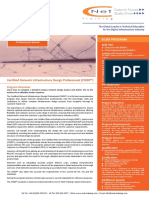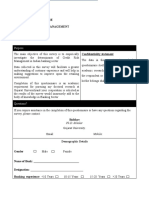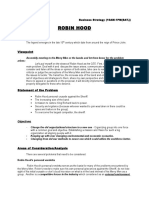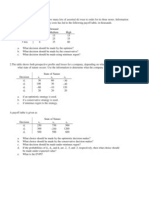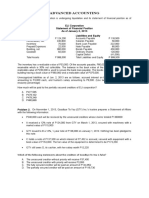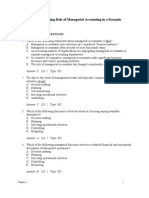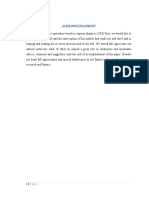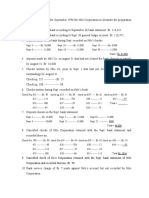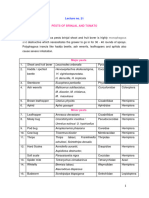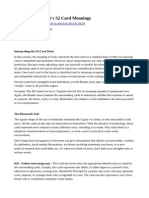100%(1)100% found this document useful (1 vote)
293 viewsRobin Hood
Robin Hood and the Merrymen face challenges from their growing organization and more powerful competitor, the Sheriff. They could improve through analyzing their internal strengths and weaknesses, focusing on new opportunities, and changing their organizational structure. Robin Hood should decentralize control by delegating responsibilities, such as appointing supervisors over recruitment, food, shelter, and spies. Recommended strategies include taxing merchants in the forest, gaining villagers as representatives, diversifying funding sources, and strengthening bonds with farmers for support and resources.
Uploaded by
Muzna FahadCopyright
© Attribution Non-Commercial (BY-NC)
Available Formats
Download as DOCX, PDF, TXT or read online on Scribd
100%(1)100% found this document useful (1 vote)
293 viewsRobin Hood
Robin Hood and the Merrymen face challenges from their growing organization and more powerful competitor, the Sheriff. They could improve through analyzing their internal strengths and weaknesses, focusing on new opportunities, and changing their organizational structure. Robin Hood should decentralize control by delegating responsibilities, such as appointing supervisors over recruitment, food, shelter, and spies. Recommended strategies include taxing merchants in the forest, gaining villagers as representatives, diversifying funding sources, and strengthening bonds with farmers for support and resources.
Uploaded by
Muzna FahadCopyright
© Attribution Non-Commercial (BY-NC)
Available Formats
Download as DOCX, PDF, TXT or read online on Scribd
You are on page 1/ 2
Strategic Management Case Study Report
Robin Hood and the Merrymen
Background
Robin Hood and the merrymen are in the business to steal from the rich and give it to the needy. The
organization started by Robin Hood grew large with lot of new recruits. Robin Hood being the head of
troops delegated functional duties to his subordinates. Their largest competitor, the sheriff, had become
powerful, more organized and a dominant threat to the existence of the band.
The Merrymen could adopt several strategies in order to overcome the sheriff.
Robin Hood and his men could improvise internal operations in order to compete by finding
internal strengths and overcoming their weakness.
Merrymen can focus on new market opportunity, consumer expectations, competitors actions
and technological advances.
Robin Hood could choose the external and internal focus and perform a SWOT analysis to figure
out the complete standing of the Merrymen compared to their competitors
Problems
Lack of discipline
Food, shelter and space shortage
Training (As everyone was welcomed to join the organization)
Maintenance and operating Cost
Challenges to organize big and little trained group.
Change management
Goal alignment of the individual with that of a group
Security and Vigilance
Changing from old war methods to newer ones
Current Business Model
Robin Hoods organization is haphazard. He is assisted by three lieutenants for core functions and is
certainly under employed as far as management is concerned. It is very evident that managing such a
huge organization is difficult using a top-down approach. There may be certain functions that are being
Team Members
Khalid Ahmed, Muzna Qaiser,
Khadeja Shami & Jawad Hasan
ignored due to less supervisors and managers. There is not much interaction between the various
departments. Robin Hood needs to change the organizational structure. He should change it to the
below mentioned structure and delegate responsibility in order to manage the bigger group that he now
commands. This will result in decentralization of the control, delegation of power and empowerment of
the people.
Proposed Organizational Structure
Put the recruitment process in order. A good way is to recruit supervisors and lay down policies
for recruitment such as limiting the age and family background. By doing this, he shall only get
workers who are focused and share the similar goal.
Appoint a food shelter and medical supervisor under his human resource manager. Food and
shelter supervisors will concentrate on sole responsibilities. The main role of food supervisor will
be to constantly look for newer and cheaper sources of food.
Build a spy division with a fleet of spies and deploy them around the sheriffs office. The job
should encompass the cross verification of the details of new recruits.
Recommended Strategies
Levy tax on merchants who pass by the forest. Levying regular tax shall act a constant source of
income. Also, the merchants can be informed that they will not be looted in case they adhere to
the tax policies. They will be rather protected in Robin Hoods territory. This shall be a win-win
situation for both as Robin Hood shall get regular income and merchandisers dont have to
worry about getting looted in forest and can concentrate on other issues
Encourage a villager to become Robin Hoods spokesperson and representative in the kingdom
Ask people to participate in the King Richards rescue mission
Robin Hood should not recruit new men in his group and create a bubble that could burst.
Rather, he should diversify. Enrich his men with funds and support to become merchants and
traders. The group thus formed should be supported and hence they can use their power to
threat other merchants as well as the prince
He should bond and increase his relationship with the farmers. Instead new recruitment should
be done from among the farmers as it shall serve as a strong economic backup and also an
abundant supply of cheap food
He should try to get people from princes court on his payroll. Acting as a spy and thus letting
him know of any new strategy prince is formulating or any new business that he indulges to get
in. At the same time Robin Hood needs to be ready to diversify into new business in case, he get
to know about it
Enforce discipline by practicing it
You might also like
- JEFFREY RHOADS Schwab - Statement - CheckingNo ratings yetJEFFREY RHOADS Schwab - Statement - Checking8 pages
- The Psychology Underlying Successful Retention Practices: John Bean Shevawn Bogdan Eaton, P .DNo ratings yetThe Psychology Underlying Successful Retention Practices: John Bean Shevawn Bogdan Eaton, P .D17 pages
- Certified Network Infrastructure Design Professional CNIDPNo ratings yetCertified Network Infrastructure Design Professional CNIDP2 pages
- Est. Hrs. Procedures W/P Ref. by Comments/Explanations50% (2)Est. Hrs. Procedures W/P Ref. by Comments/Explanations4 pages
- Standard Audit Programme Guide: SAPG Ref.: 0202 Function: Finance Activity/System: PayrollNo ratings yetStandard Audit Programme Guide: SAPG Ref.: 0202 Function: Finance Activity/System: Payroll9 pages
- Exercises in Operational Budgeting - Solve in Excel Spread SheetNo ratings yetExercises in Operational Budgeting - Solve in Excel Spread Sheet2 pages
- Managerial Economics: Unit 9: Risk AnalysisNo ratings yetManagerial Economics: Unit 9: Risk Analysis49 pages
- Short Term Decision Making: Question No. 1No ratings yetShort Term Decision Making: Question No. 12 pages
- 3.the City of San Jose-Excel Modelling-Fundamentals of Financial Management-James C. Van Horne - John M. Wachowicz50% (2)3.the City of San Jose-Excel Modelling-Fundamentals of Financial Management-James C. Van Horne - John M. Wachowicz1 page
- Universal Robina Corporation:: Holy Angel UniversityNo ratings yetUniversal Robina Corporation:: Holy Angel University5 pages
- MGT6 Module 3 Total Quality Management OMNo ratings yetMGT6 Module 3 Total Quality Management OM9 pages
- Q4-The Following Are The Monthly Rates of Return For Madison Software Corp. and For Kayleigh0% (1)Q4-The Following Are The Monthly Rates of Return For Madison Software Corp. and For Kayleigh2 pages
- Psa 610 Using The Work of Internal Auditors: RequirementsNo ratings yetPsa 610 Using The Work of Internal Auditors: Requirements2 pages
- Theoretical Background of Credit Risk ManagementNo ratings yetTheoretical Background of Credit Risk Management16 pages
- Cancelled Check of Nice Corporation Returned With The Sept. Bank Statement of Nile Corporation and Recorded Thereon: Br. 98No ratings yetCancelled Check of Nice Corporation Returned With The Sept. Bank Statement of Nile Corporation and Recorded Thereon: Br. 982 pages
- Chapter 4 - Securities Markets & OrganizationsNo ratings yetChapter 4 - Securities Markets & Organizations28 pages
- Chapter8 Fiancial Reporting by James HallNo ratings yetChapter8 Fiancial Reporting by James Hall43 pages
- Master in Business Administration Mba 308 - Financial ManagementNo ratings yetMaster in Business Administration Mba 308 - Financial Management5 pages
- Convertibles, Exchangeables, - and WarrantsNo ratings yetConvertibles, Exchangeables, - and Warrants26 pages
- Employee Prespective: A Study On The Effect of Benefits Package On Organizational Commitment and Job PerformanceNo ratings yetEmployee Prespective: A Study On The Effect of Benefits Package On Organizational Commitment and Job Performance2 pages
- Measuting The Invisible - KPI For Managing Construction LogisticsNo ratings yetMeasuting The Invisible - KPI For Managing Construction Logistics26 pages
- Article 414. All Things Which Are or May Be The Object ofNo ratings yetArticle 414. All Things Which Are or May Be The Object of9 pages
- Industry and Marketplace Analysis: Stephen Lawrence and Frank MoyesNo ratings yetIndustry and Marketplace Analysis: Stephen Lawrence and Frank Moyes20 pages
- Leon County Booking Report: Sept. 25, 2021No ratings yetLeon County Booking Report: Sept. 25, 20214 pages
- TEST FAR670 - OCT2022 (NACAB10B) - 10 Dec 2022No ratings yetTEST FAR670 - OCT2022 (NACAB10B) - 10 Dec 20223 pages
- A Sample Rice Processing Mill Business Plan Template100% (1)A Sample Rice Processing Mill Business Plan Template15 pages
- What Good Are Interviews For Thinking About Culture? Demystifying Interpretive AnalysisNo ratings yetWhat Good Are Interviews For Thinking About Culture? Demystifying Interpretive Analysis27 pages
- Claude - Adverse Action Notice DisclosureNo ratings yetClaude - Adverse Action Notice Disclosure2 pages





